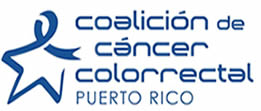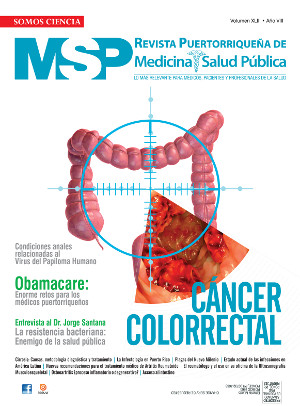Baseline information about colorectal cancer in Puerto Rico
Statistics of colorectal cancer in Puerto Rico
Colorectal cancer occurs when the cancerous cells develop in the colon or the rectum. In Puerto Rico, colorectal cancer represents the second leading cause of cancer in men and women. In addition, colorectal cancer represents the second and third cause of death in women and men, respectively (Puerto Rico Central Cancer Registry (PRCCR), 2007). During the year 2003, colorectal cancer accounted for 14% of all diagnosed cancer cases. During the year 2004 this type of cancer represented 13% of all cancer deaths (PRCCR, 2008). According to the Puerto Rico Central Cancer Registry, during the period of 1999-2003, one in every 24 men, and one in every 25 women currently born in Puerto Rico will be diagnosed with colorectal cancer during their life.
View an educational video about Colorectal Cancer prevention
For more information see Puerto Rico Central Cancer Registry
Colorectal cancer symptoms
- Change in bowel habits (diarrhea or constipation)
- Blood on the stool
- Thin stool
- Nausea and vomiting
- Abdominal pain
- Weight loss and fatigue
Source: National Cancer Institute (2005)

Colorectal cancer risk factors
- Age (50 years of age and older)
- Personal or family history of colorectal cancer or benign (not cancerous) colorectal polyps
- Personal history of inflammatory bowel diseases
- Family history of inherited colorectal cancer
- Use of tobacco, obesity, and a sedentary lifestyle
Source: Prevent Cancer Foundation www.preventcancer.org
Colorectal cancer screening tests
- Fecal Occult Blood Test (FOBT) evaluates the blood presence on the stool
- Barium enema uses barium sulfate to mark the bowel and then to do the radiographies
- Sigmoidoscopy uses a flexible tube with camera to revise the lower bowel (sigmoid colon and the rectum)
- Colonoscopy uses a flexible tube with camera to revise all colon and rectum
- Colonography (virtual colonoscopy) radiography test to see the colon
- Stool DNA evaluates the presence of genetic information changes (mutations) on the stool samples
For more information see Screen 4 Colon Cancer

Treatment
- Surgery
- Chemotherapy (medications to destroy or prevent the cancerous cells growth)
- Radiotherapy (X Rays high levels to destroy cancerous cells)
For more information see The Johns Hopkins Medical Institution
Prevention
- Medical examination on a regular basis
- Exercise regularly and maintain a healthy weight
- Decrease consumption of red meats
- Eat a high-fiber diet rich in fruits, vegetables, and whole grains
- Do not smoke
- Do not drink alcohol. If you drink alcohol, drink in moderation
- Check with your doctor about the tests to be performed to detect some cancers early
Source: Prevent Cancer Foundation www.preventcancer.org